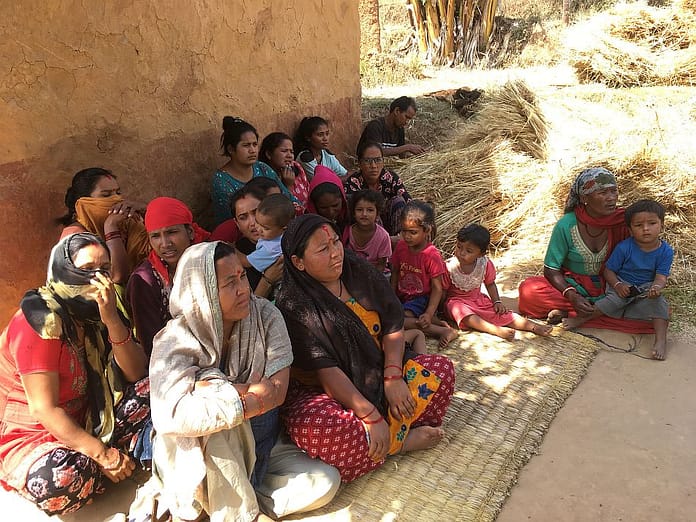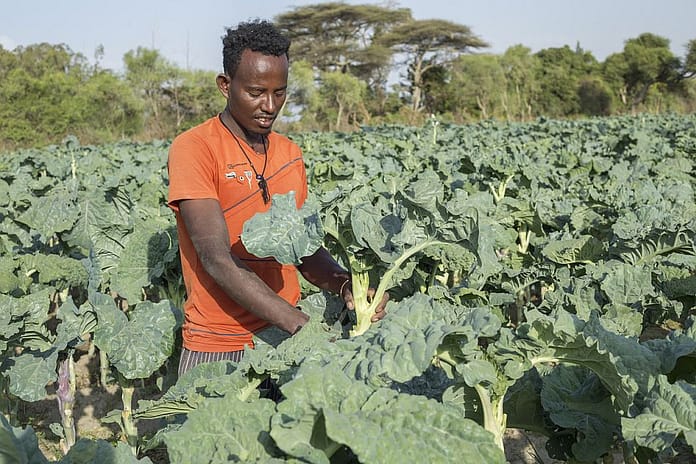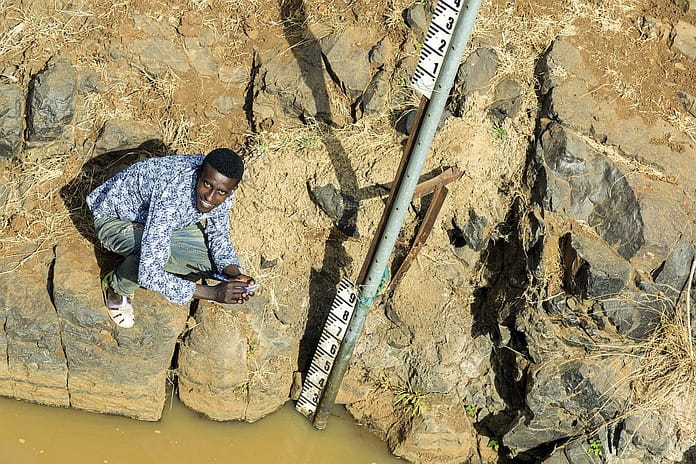By Mirja Michalscheck and Birhanu Zemadim Birhanu
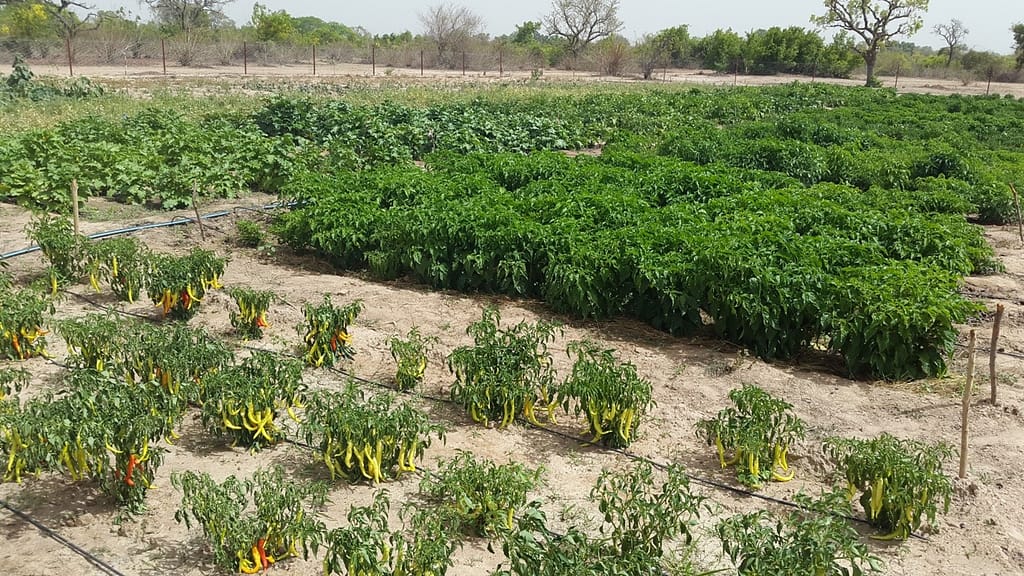
Water is a fundamental element for crop and livestock production. The livelihoods of smallholder farmers depend on the availability of water for different uses. Crop production in Sub-Saharan Africa is typically restricted to rain-fed periods, leading to migration, off-farm work, or unemployment during the dry season. Even the rainy season is increasingly plagued by dry spells, droughts, or floods due to climate change, leading to losses in crop harvests, livestock productivity and farm incomes. Integrated agricultural water management (AWM) can be a game changer for crop and livestock production. It makes crop and livestock production in different seasons more resilient and enables an additional irrigated crop production in the dry season. Agricultural water management is key to sustainable and productive mixed farming systems.
The International Water Management Institute (IWMI), in partnership with other CGIAR centers, governmental agencies, NGOs, universities and private sector actors, has investigated and engaged in scaling sustainable and integrated AWM practices. AWM, as part of mixed farming systems, includes soil water conservation (SWC) and irrigation practices in close integration with farm livestock components. The focus is on producing nutritious food, such as dairy, eggs or vegetables, and fodder for livestock during the dry season, to support household nutrition and income, and feed shortages.
Spotlight: Ghana
Mixed-farming systems make up the majority of Ghana’s agricultural production. A recent IWMI publication reported drought shocks as the most severe for smallholder farmers in Northern Ghana, exemplifying the need to build water-related resilience in mixed-farming systems. Only two percent of the agricultural area in Ghana is under irrigation, and SWC measures evince low adoption rates. This is partly attributed to a lack of efficient extension services. Other factors are related to farm households’ socio-economic challenges and absence of appropriate scaling strategies. Irrigation during the dry season was found to significantly increase farm household resilience to shocks, including drought, but also crop pests, market and health shocks.
IWMI promotes good agricultural water management practices through scaling partnerships and demand-driven research to foster solar-powered irrigation. In April 2024, IWMI and the Ghana Irrigation Development Authority signed a Memorandum of Understanding to jointly foster sustainable water and agricultural practices, particularly irrigation development. Under the planting for food and jobs national strategy, Ghana is building resilience through irrigation for cocoa, one of its primary agricultural export commodities. Due to climate change, cocoa production has become increasingly vulnerable, and water stressed. Some smallholder farmers supported by IWMI projects are beginning to explore irrigation to counteract climate-induced water-stress and for an increased yield. IWMI has teamed up with the Ghana Cocoa Board to explore and advance the use of solar-powered irrigation. Cocoa farmers have reported on the cost-effectiveness and ease-of-use of solar-powered irrigation pumps.
As part of IWMI’s role in the CGIAR Initiative on Sustainable Intensification in Mixed Farming Systems, IWMI is engaging in water and nutrient saving technologies for rice growers in the northern and central regions of Ghana. The low-cost Alternate Wetting and Drying technology and use of irrigation scheduling sensors are being implemented at two irrigation schemes: Golinga and Botanga. With the AWD, water-savings enhanced rice grain yield and quality. Experimental results indicated a significant increase (p<0.05) in rice biomass and grain production in the two sites. Farmers are witnessing an increased availability of rice straw used as livestock feed. AWD can thus be promoted as an agricultural water management practice in sustainable and mixed farming systems for improved food and feed security.
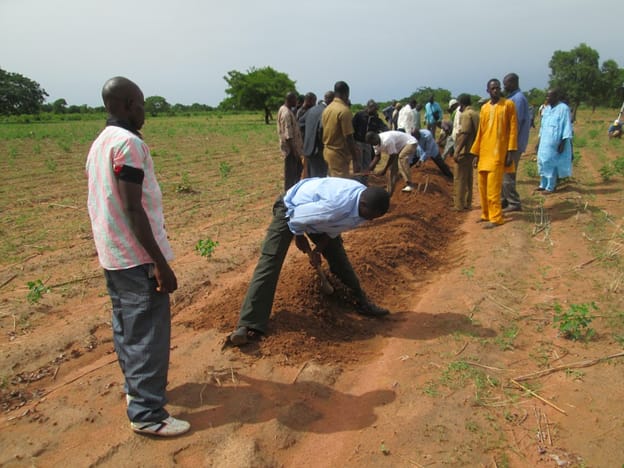
Spotlight: Mali
Agricultural production in Mali is characterized by mixed farming systems, too, facing a drier climate than Ghana and a stronger dependency on groundwater resources for irrigation mainly during the dry season. A recent IWMI study in Global Food Security highlights the importance of the enabling environment for the uptake of irrigation among smallholders in Mali. Inclusive policies and interventions (IPI) can incentivize and involve women, youth and poor farm households in IPI design and framing to better support a resilient local production of dry season vegetables.
IWMI has built partnerships and provided capacity building to scale solar-powered irrigation. Publications highlight that water management practices help Malian farmers to regulate water use efficiency and access and prevent intense gully formation and erosion, which are significant problems to agricultural productivity in the country. Water management practices in Mali involve the use of solar- powered irrigation technologies and establishing small-scale infrastructure such as check dams and terraces. Terraces serve to reduce the force of water flow downslope, while contour bunds absorb and accumulate soil and water on farm fields. Planting vetiver grass or forage pastures and other fast-growing tree species along the slopes also adds to the absorption of rainwater and mitigation benefits. These actions enable heavy or rapid water flow from upland areas to recharge aquifers and increase the availability of water in shallow aquifers or streams. In connection with this, efficient water management practices through irrigation at the farm level help to prevent soil, water, and nutrient loss and improve crop yields.


